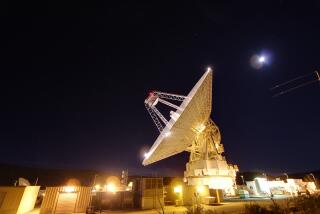Russian Plan Would Hike International Space Station Cost : NASA: Redesign would delay project, add up to $2 billion to price, agency says. It is also seen as a threat to cooperative venture with U.S.
- Share via
WASHINGTON — A Russian proposal to redesign the international space station would cause up to a one-year construction delay and boost the project’s cost by as much as $2 billion, according to a space agency analysis provided to Congress.
The National Aeronautics and Space Administration also unveiled to congressional leaders a contingency plan, should Russia drop out of the space station program, that would require U.S. contractors to supply alternative hardware at an estimated $500-million cost to U.S. taxpayers.
Rep. F. James Sensenbrenner Jr. (R-Wis.), chairman of the House Science Committee’s subcommittee on space and aeronautics, said in an interview Tuesday that the Russian proposal for redesigning the space station is unacceptable.
Sensenbrenner said that the cost estimates, provided to him by NASA, would clearly jeopardize congressional support just when a strong coalition has formed to protect the controversial $30-billion program, which has barely survived several efforts to kill it.
“I can say unequivocally that [going along with the Russian] redesign will kill American support for the program,” Sensenbrenner said. “This is the most serious issue that has come up since the cooperative agreement was signed.”
Russia joined the international space program in 1993, although a formal agreement covering its participation has never been signed. U.S. officials, however, said that they believe the Russians are committed to the current design.
Russian space officials met with their NASA counterparts last week in Houston, proposing that the international space station be assembled around the existing Russian Mir, rather than starting from scratch as originally planned.
NASA has not yet formally responded to the Russian proposal but agency officials--including Administrator Daniel S. Goldin--have said it is not acceptable. U.S. and Russian officials are scheduled to meet in late January and until then NASA is attempting to avoid any controversy.
“We did not find the proposal they brought to Houston acceptable but we are trying to have some good-faith discussions with them to see . . . where they want to go,” NASA spokesman Jeff Vincent said.
Vincent said Russia has not threatened in its proposal to abandon the program if NASA balks at the suggested redesign. Nonetheless, Russia’s intentions remain cloudy, particularly in the aftermath of the strong showing by Communists in the recent Russian elections.
One apparent reason for the Russian proposal is a belief among Russian space officials that Mir can continue to operate longer than originally expected. The Russians also have told NASA that they might operate Mir in addition to participating in the international program, a suggestion that seems far-fetched to outside experts, given Russia’s serious budgetary problems.
In the week since the proposal was made, NASA officials have concluded that significant redesign of hardware would be required that would cause a six-month to one-year delay and a $1-billion-to-$2-billion overrun on U.S. parts of the program, according to Sensenbrenner. The NASA-led program also includes participation by Japan, Canada and Europe, though the effect on those partners is not as severe.
The $500-million cost of NASA’s contingency plan ordinarily would represent a major political problem for NASA.
Sensenbrenner said the cost could be partly absorbed, however, by using a payment of $300 million planned to go to Russia under the cooperative agreement covering its participation in the program.
A Russian withdrawal from the program would “poison the well” for other U.S.-Russia cooperative programs, Sensenbrenner predicted.
“If this deal falls apart, it will be an indication that Russia is becoming insular again,” he added. “I am not saying the Cold War is going to start up again, but it is not a step in the right direction.”
More to Read
Sign up for Essential California
The most important California stories and recommendations in your inbox every morning.
You may occasionally receive promotional content from the Los Angeles Times.













